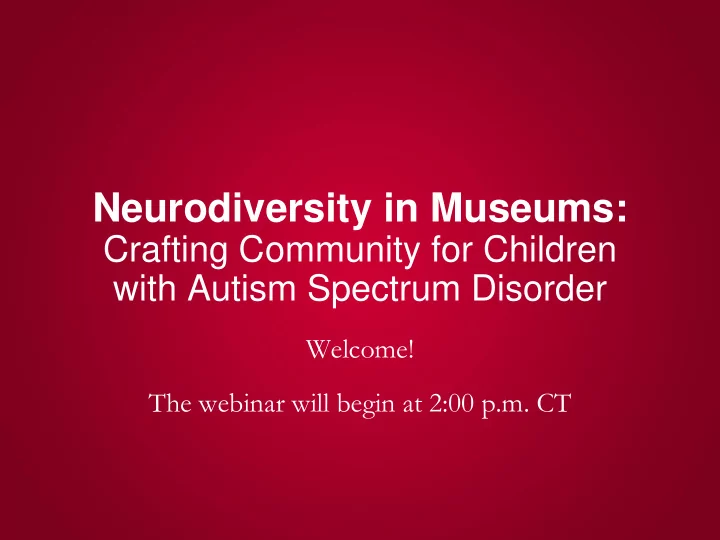

Neurodiversity in Museums: Crafting Community for Children with Autism Spectrum Disorder Welcome! The webinar will begin at 2:00 p.m. CT
THC Museum Services • The Museum Services Program provides support, resources, and training to museums in Texas. • Consultations • Webinars and workshops • Resources
THC Museum Services www.thc.texas.gov/museum-services • On our webpage: • Webinars • Workshops • Grants and Fundraising • Helpful Resources • Connect and Learn
THC Museum Services • Laura Casey Museum Services Program Coordinator laura.casey@thc.texas.gov 512-463-6427 • Emily Hermans Museum Services Program Specialist emily.hermans@thc.texas.gov 512-463-5921
Real Places Conference 2020 • January 29-31, 2020 in Austin • Keynote: Elizabeth Merritt, Center for the Future of Museums • Museum-focused sessions include: • Minimizing Impact on Visitors and Staff During Construction Projects • Fund Development and Successful Storytelling • Math & History Programming • Podcasting • Programs and Exhibits in Response to Current Events • Register at www.realplaces.us
Upcoming Free Webinars • Museum Relevance: Exhibitions for Social Justice • Thursday, January 23, 10:00 a.m. CT • Sealing the Deal: Making a Compelling Case for Funding with Private Foundations • Tuesday, February 11, 2:00 p.m. CT • Bringing Objects & Artifacts to Life • Thursday, February 27, 2:00 p.m. CT
AASLH Webinars • Museum Relevance: Exhibitions for Social Justice • January 7, 3:00 p.m. ET — Part 1 • January 23, 3:00 p.m. ET — Part 2 • $30 registration with code THC20 at learn.aaslh.org • Recordings of both sessions available to registrants
Jackie Spainhour
NEURODIVERSITY & MUSEUMS CREATING INCLUSIVE SPACES FOR CHILDREN WITH AUTISM SPECTRUM DISORDER By: Jackie Spainhour VAM Leadership & Advocacy Fellow, 2018 Director, Hunter House Victorian Museum
WELCOME! AND WHY AUTISM AND MUSEUMS? • That’s Me! Hi, I am Jackie, and this is my son, Declan • Declan was diagnosed with autism spectrum disorder in 2018 • Here you see him on his last day of his first year of preschool- I’m a proud mama! • As a museum professional and autism mom, I started asking myself how museums could be more inclusive for families like mine • VAM gave me this incredible opportunity to find out more…read on!
GOALS FOR THIS DISCUSSION • Help you define and identify autism spectrum disorder • Explain to you why it is vital that your facility serves this demographic • Offer advice from both myself and other museum professionals on how to make changes to your current programs and offerings to be more inclusive • Empower you to move forward on advocating for a neurodiverse museum world
WHAT IS AUTISM SPECTRUM DISORDER? “developmental disability that can cause significant social, communication and behavioral challenges”( https://www.cdc.gov/ncbddd/autism/facts.html). What does it look like? • Not responding to one’s name • Inability to communicate effectively • Limited emotional understanding • Avoiding eye contact • Playing with or using items in unusual ways
WHY IS THIS SO IMPORTANT?
ADVANTAGES TO INCLUSION FOR CHILDREN WITH ASD • Inadvertently attract a millennial audience. • Many changes benefit all children, whether they have ADHD, autism, Down’s syndrome, or are neurotypical. • Everyone will benefit from a more inclusive environment. Above: Picture of one of our Junior Docents giving a tour to a group of children with mixed abilities
TOP TEN WAYS TO BE MORE INCLUSIVE For children with autism spectrum disorder
1. TRAIN YOUR STAFF! Consider contacting your local autism society for help in scheduling training for anyone involved with the public at your facility. Find resources here: https://www.autism-society.org/
2. FIDGET BASKETS AND VARIED CRAFT MATERIALS Consider abilities and dexterity when selecting materials for crafts. Have a fidget basket at the entrance to help children feel grounded.
3. USE SOCIAL STORIES & SIGNAGE Social stories prepare them before; signs direct them while they are there. For help with creating your own social story, visit the Smithsonian’s resources here: https://www.si.edu/accessibility Example from : http://pinchukartcentre.org/en/edu cation/inclusive_programmes
4. CREATE A QUIET ROOM/SPACE From the Chrysler Museum of Art, Norfolk, VA
5. SWITCH UP YOUR SEATING OPTIONS Use foam flooring, bean bags, carpet, and other types of chairs and seating areas to give everyone an opportunity to find a space comfortable for them. EXAMPLES =>
6. MAKE A SCAVENGER HUNT Use pictures instead of words for younger children. Example from: https://www.frugalcouponliving.com/spring-break-staycation/
7. LIGHTS DOWN, MUSIC OFF Create a quiet environment to promote calm and concentration.
8. OFFER SPECIAL HOURS Offer hours before or after you are open, but make sure you are doing this in combination with other efforts towards inclusion. Don’t just ‘check a box’.
9. ASK THE PARENTS Consider going directly to the source- the parents. Ask them what they need and have them involved in the creation of new spaces and programs designed for their children. Save the guesswork- ask for help!
10. BE HONEST ABOUT YOUR LIMITATIONS Not every place can be entirely inclusive, no matter their good intentions. Historic house museums are a good example. Many are not ADA compliant due to the nature of the properties. The best thing you can do is be up-front with an autism family, or any special needs group, about what you can and cannot do for them. The worst experiences are when museums promise the world and the real experience turns out very differently. Those lead to negative, and usually public, reviews. Don’t sugarcoat your situation - be honest! Autism families will support you more if you are clear about your capabilities so that they can better prepare for their visits.
THANK YOU! Contact me with any need for trainings, consultations, or other aid: hhvm1894@gmail.com Thank you to THC, AASLH, VAM, Hunter House, my Board, my husband, and the many friends, colleagues, doctors, therapists, and others I consulted. Most importantly, this is for Declan, May he grow up in an inclusive, compassionate world led by museums making small changes.
Recommend
More recommend